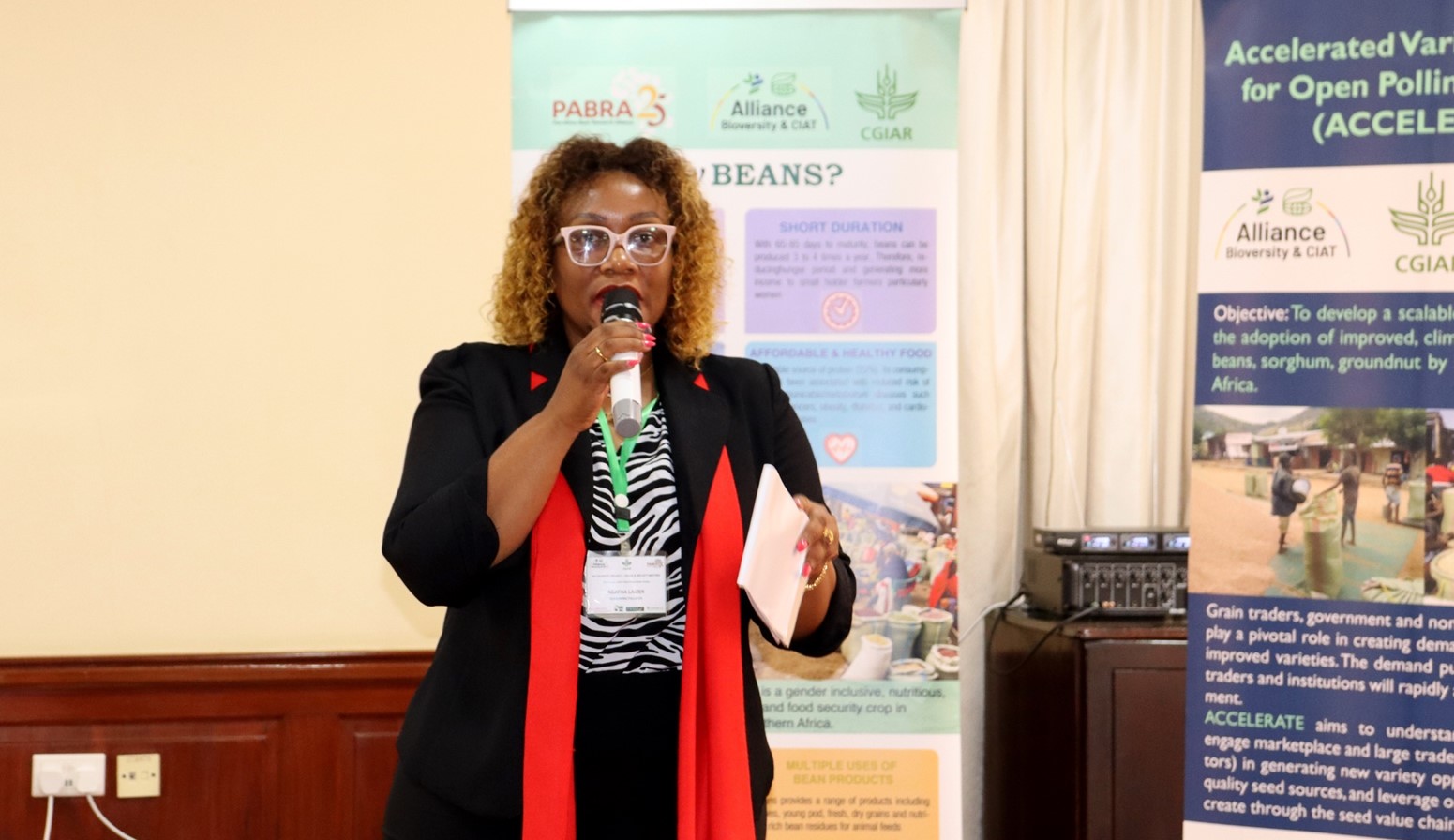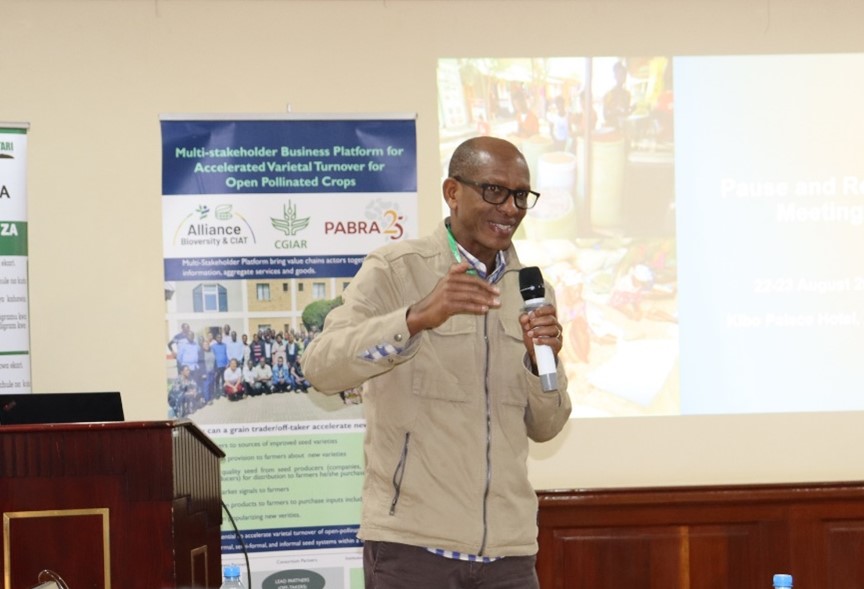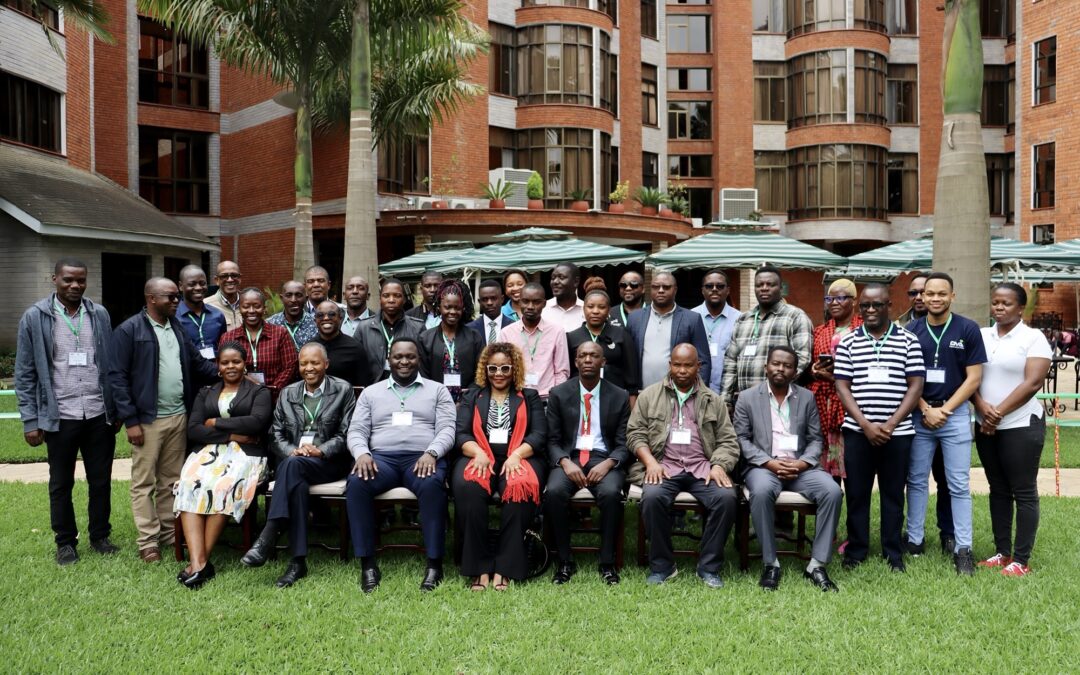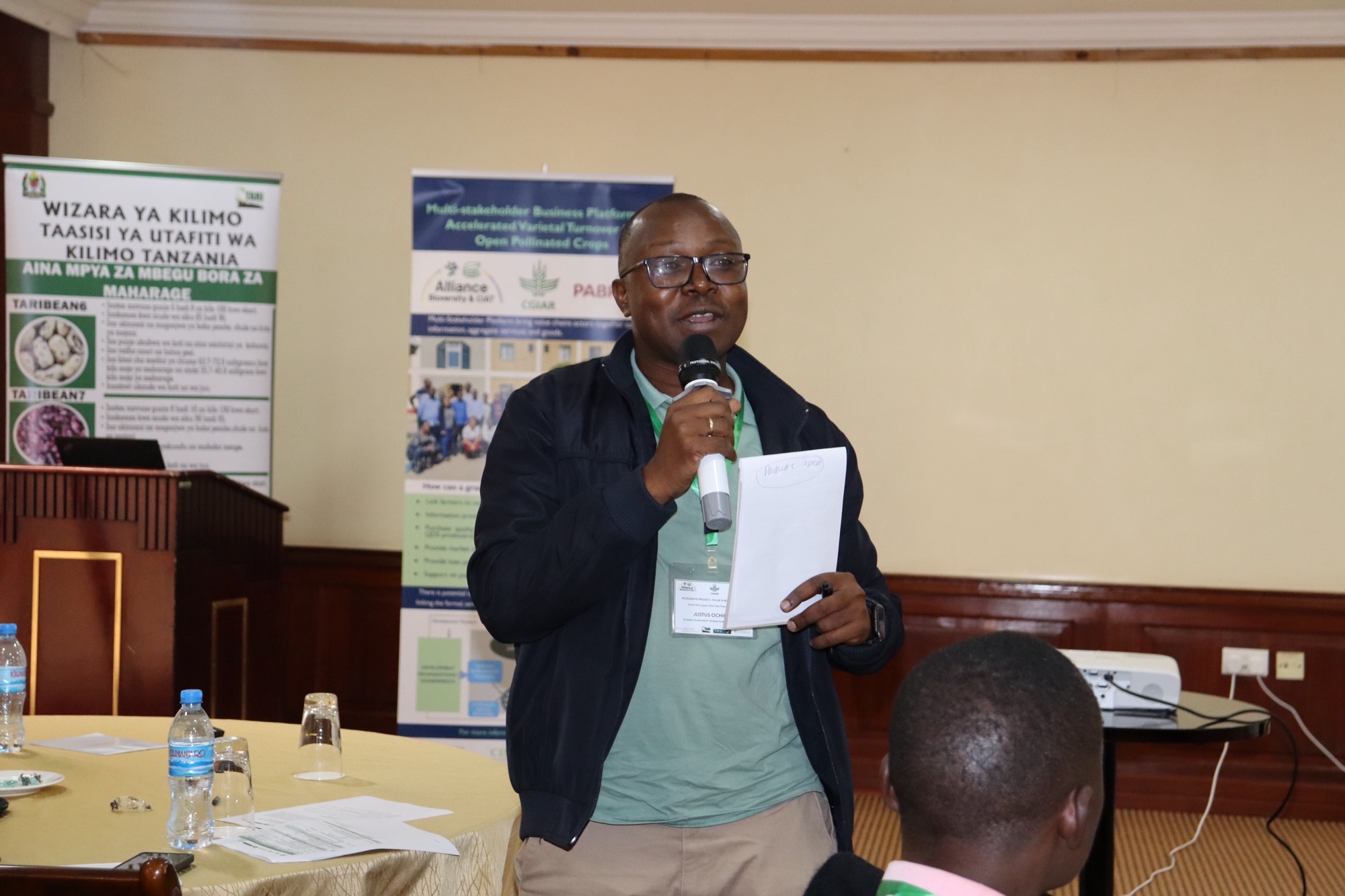By Martin Majambele, Atupokile Mwakatwila, Radegunda Kessy & Justus Ochieng
In a landmark pause and reflect meeting held at Kibo Palace Hotel on 22-23 August 2024 in Arusha – Tanzania, key agricultural stakeholders from across the country and beyond gathered to review and advance the Accelerated Variety Turnover for Open-Pollinated Crops in Tanzania (ACCELERATE Project). The groundbreaking initiative is designed to revolutionize the adoption of improved open-pollinated crop varieties. Spearheaded by a coalition of the Alliance of Bioversity International & CIAT (The Alliance), International Maize and Wheat Improvement Centre (CIMMYT), Tanzania Agricultural Research Institute (TARI), Tanzania Official Seed Certification Institute (TOSCI), and the Pan-Africa Bean Research Alliance (PABRA-Africa), this effort is enhancing the productivity and sustainability of sorghum, groundnuts, and common beans in the country.
The meeting assessed progress and strategized future actions to integrate improved seed varieties into formal, semi-formal, and informal seed systems, ensuring farmers have increased access to high-quality seeds and thereby boosting agricultural productivity across Tanzania. The initiative is enhancing seed availability and quality, which in turn improves crop yields and sustainability. This effort is also creating job opportunities for youth, increasing incomes for women, and positioning Tanzania as a major bean supplier in the region.
The meeting also underscored the importance of continued innovation, partnership, and strategic planning to meet the project’s ambitious goals, with Dr. Nicholaus Kuboja, Centre Director of TARI Selian, urging parties to capitalize on the connections to further enhance collaboration and innovation.
Strides registered
Through collaborative efforts and strategic planning, the initiative has made significant strides. For instance, Arusha-based Seasoning Palet, which specializes in value addition for groundnuts, has successfully utilized improved groundnut varieties to enhance product quality.
Agatha Laizer, Managing Director of Seasoning Palet, highlighted that her company specializes in two varieties: Tanzanut and Naliendele 2016. These varieties are utilized to produce peanut butter and snacks such as crunchy nuts. Laizer proudly reported that Seasoning Palet collaborates with farmers in three key regions of Mlele, Masasi, and Handeni.
She also commended the collaborative relationship among the project partners, led by ACCELERATE Project Coordinator, Dr. Justus Ochieng, for fostering sustainability through the provision of quality declared seeds, which enhances both production and quality control.

Picture 1: Agatha Laizer, Managing Director of Seasoning Palet making her presentation during the meeting
Similarly, Bora Food in Geita has made remarkable advances in agricultural innovation. After receiving demonstration seeds for beans, the company achieved outstanding results, with the beans performing exceptionally well. This success has enabled Bora Food to train 20 farmers in quality seed production, each cultivating three acres of beans, thereby significantly enhancing local production and improving seed quality.
Building on their success with beans, the company has recognized the potential in groundnuts and is now poised to invest in this promising sector. They have requested specialized training to ensure proper production techniques, aiming to further enhance their operations and contribute to sustainable agriculture in the region.
Dr. Ochieng, reiterated the tremendous opportunities that lie ahead for agricultural stakeholders in Tanzania. He highlighted the importance of leveraging increased awareness around the project to exploit these opportunities fully.
“This gathering served not only as a platform for reflection but also as a valuable space for traders and NGOs to share their long-term successes. We have developed a strategic plan for NGOs to collaborate in delivering seeds to the designated areas. Additionally, we are prepared to provide traders with demonstration seeds specifically for farm trials,” explained Ochieng.
He added that plans are underway to actively engage seed producers, ensuring that each stakeholder has a clearly defined role in the process. According to Ochieng, the priority for seed producers is to scale up seed multiplication efforts to meet the growing demand and ensure sustainable production.
On his part, Jean Claude Rubyogo, PABRA Director and Global Bean Program Leader, shared insights on the broader implications of the ACCELERATE project. He stressed the dual benefits of increased crop productivity: providing job opportunities for youth and enabling women to earn satisfactory incomes. Rubyogo noted the progress achieved in bean production over the past decade. He also pointed out that this productivity boost is not only improving local agriculture but also positioning Tanzania as a major supplier of beans to ten neighbouring countries.
“Ten years ago, the average yield was 0.78 tonnes per acre; today, it has risen to 1.3 tonnes, with a target of reaching two tonnes per acre. This growth will significantly boost national income and drive broader economic development throughout the region,” he said.
He noted that this surge in productivity is not only advancing local agriculture but also establishing Tanzania as a premier supplier of beans to ten neighboring countries, with the expansion set to significantly boost national income and drive broader economic development throughout the region.
While, emphasizing the importance of ongoing efforts to enhance the quality and productivity of beans, Rubyogo added that with The Alliance’s continued support, the ACCELERATE Project is well on track to deliver lasting benefits to farmers and the wider agricultural sector.

Picture 3: PABRA Director and Bean Program Leader, Jean Claude Rubyogo addressing participants at the gathering
Lessons learnt and future endevours
As the meeting advanced, the partners concentrated on key objectives: evaluating the progress of the ACCELERATE project, reflecting on lessons learned from Year 2, and refining strategies to enhance the remaining implementation period. The discussion also turned to planning for Year 3, with a renewed focus on accelerating varietal turnover and increasing productivity across seed systems in Tanzania.
Reflecting on past experiences and envisioning future strategies, the ACCELERATE Project is poised to drive transformative advancements in Tanzania’s seed systems. The ongoing collaborative spirit and unwavering dedication of the implementing partners, combined with the insights gained, foster optimism for continued progress. This will be vital in shaping a successful and impactful Year 3. The partners have reaffirmed their commitment to: (1) expand seed availability through producers to accelerate the adoption of new varieties, (2) enhance frequent communication and explore new partnerships for further acceleration, (3) complete the remaining Year 2 project activities, and (4) address any administrative challenges identified by the partners.
Ultimately, the goal remains clear: to elevate agricultural productivity, stimulate economic growth, and enhance the livelihoods of farmers throughout Tanzania and the region. Projects like ACCELERATE are pivotal in strengthening Tanzania’s agricultural sector and advancing sustainable development well beyond its national borders.


